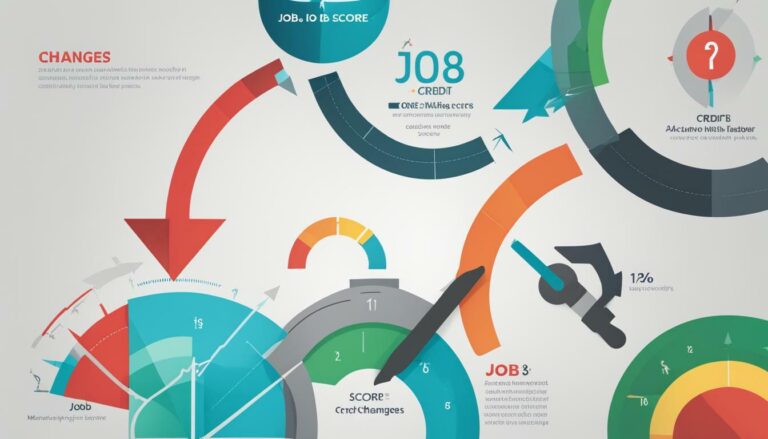Understanding Credit Score Ranges and What They Mean for You
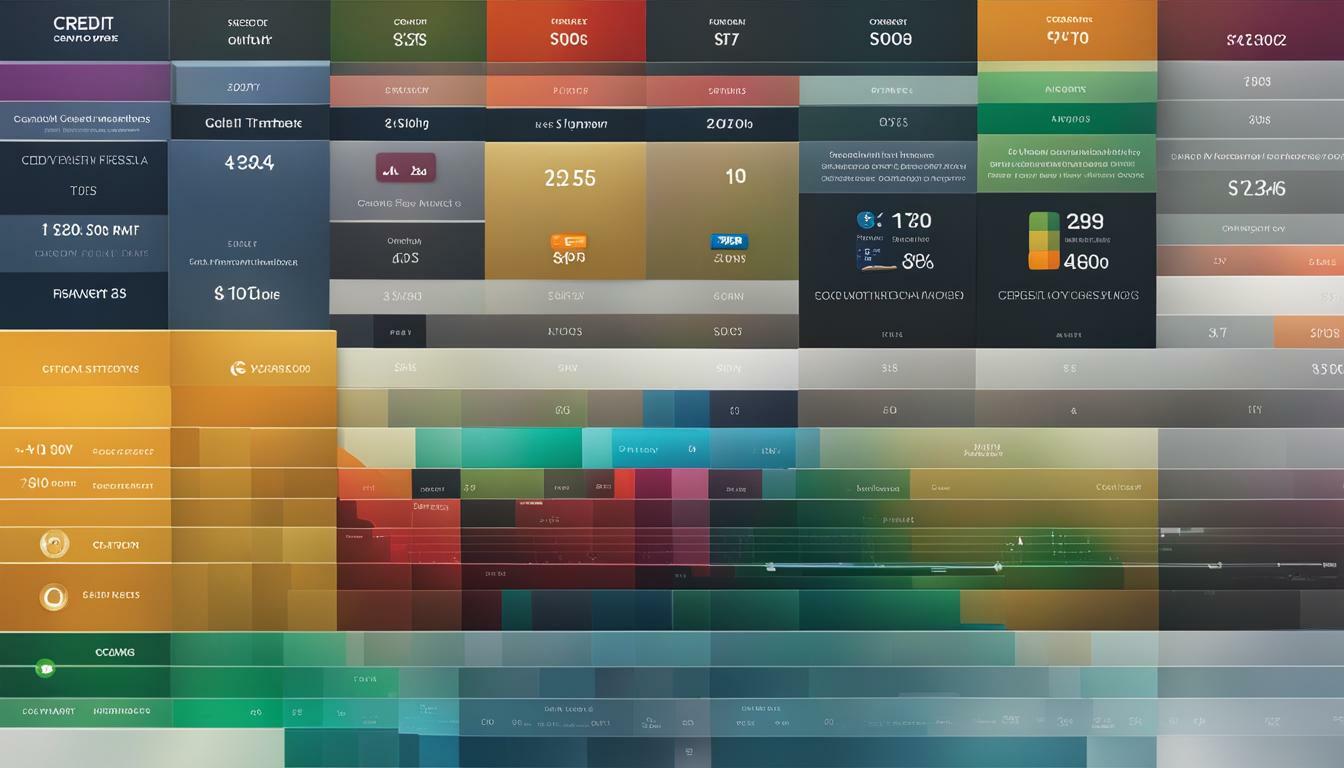
Your credit score is a vital measure of your creditworthiness, impacting your financial future in the U.S. Understanding credit score ranges and what they mean is crucial for making informed financial decisions.
Factual data: Understanding credit score ranges is crucial for borrowers as it helps lenders assess their creditworthiness. Credit scores are three-digit numbers calculated using factors such as payment history, debt levels, credit history length, credit mix, and new credit. The two main credit scoring models used in the US are VantageScore and FICO. Credit scores range from 300 to 850, with excellent scores falling between 800 and 850, and very good scores ranging from 740 to 799. A good credit score is between 670 and 739, while fair credit scores range from 580 to 669. Poor credit scores are below 580. Lenders use credit scores to determine interest rates, fees, and loan approvals. Improving credit scores is possible by making on-time payments, paying down debts, and maintaining a good credit utilization ratio.
Key Takeaways:
- Understanding credit score ranges is essential for borrowers in the United States.
- Credit scores are calculated using various factors and range from 300 to 850.
- Excellent credit scores fall between 800 and 850, while very good scores range from 740 to 799.
- Good credit scores range from 670 to 739, while fair credit scores range from 580 to 669.
- Poor credit scores are below 580 and can limit access to credit and result in higher interest rates.
The Importance of Credit Scores for Borrowers
Lenders rely on credit scores to assess your creditworthiness and make decisions about offering you credit, determining interest rates, and setting fees. Your credit score is a three-digit number that represents your creditworthiness and is based on various factors, including your payment history, debt levels, credit history length, credit mix, and new credit. Understanding your credit score is crucial because it directly impacts your ability to access credit and the terms you’ll be offered.
When you apply for a loan or a credit card, lenders will review your credit score to determine the risk of lending to you. A higher credit score indicates that you are a responsible borrower who is likely to make timely payments and manage credit responsibly. This can result in better interest rates, lower fees, and more favorable loan terms.
🚨 TUIC Errors + Low Credit Score?
CreditScoreIQ helps you build credit faster by reporting utility bills to all 3 bureaus—while you dispute errors.
Start Building Credit Today →On the other hand, a lower credit score suggests that you may have a history of late payments, high debt levels, or other credit issues. This can make it more challenging to secure credit, and if you are approved, you may be offered higher interest rates and less favorable terms.
To illustrate the significance of credit scores, consider the following example. Let’s say you are applying for a mortgage loan to purchase a house. If you have an excellent credit score in the range of 800 to 850, you may qualify for the lowest interest rates available, potentially saving you thousands of dollars over the life of your loan. However, if you have a fair credit score ranging from 580 to 669, you may be offered higher interest rates, which can significantly increase the cost of borrowing.
To improve your credit score, focus on making on-time payments, paying down debts, and maintaining a good credit utilization ratio. Regularly monitoring your credit report and addressing any errors or discrepancies can also help improve your creditworthiness.
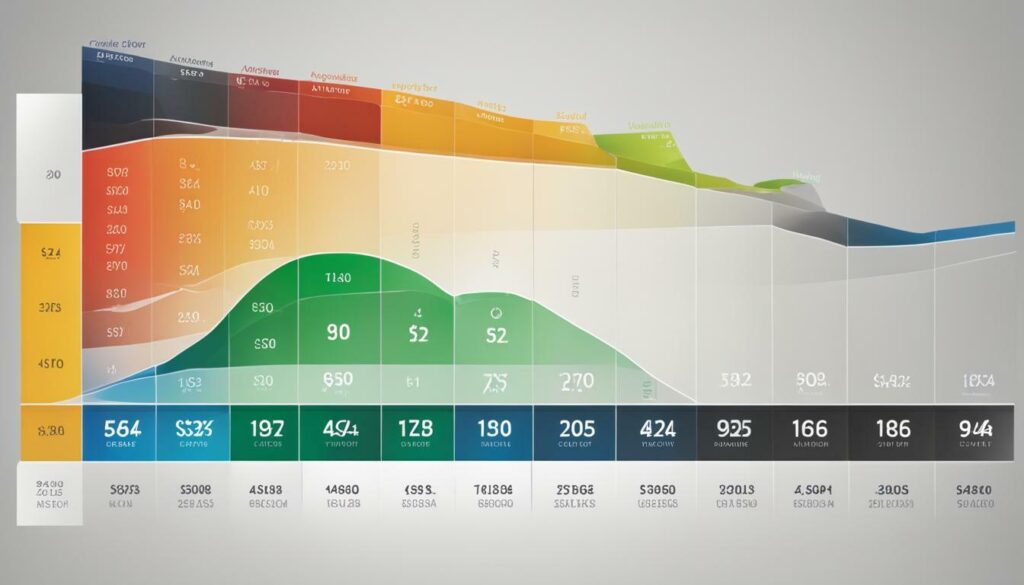
| Credit Score Range | Credit Category |
|---|---|
| 800-850 | Excellent |
| 740-799 | Very Good |
| 670-739 | Good |
| 580-669 | Fair |
| Below 580 | Poor |
The Credit Score Range Chart
The credit score range chart provides a clear breakdown of the different credit score categories and where your score fits within the range. Understanding where you fall on the credit score chart is crucial for borrowers as it helps lenders assess your creditworthiness. Your credit score is a three-digit number that plays a significant role in determining the interest rates, fees, and loan approvals you may be eligible for.
Here is a visual representation of the credit score range chart:
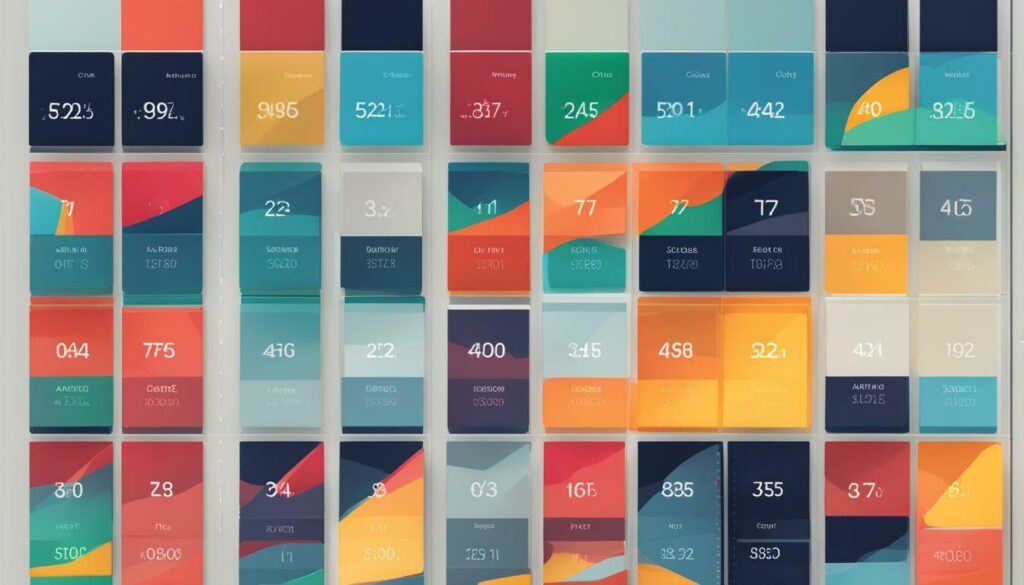
This chart showcases the different credit score categories and their corresponding score ranges. It provides a quick reference to help you determine whether your credit score falls under the excellent, very good, good, fair, or poor range. Your credit score is a reflection of your financial management and payment history, and it is important to strive for a score that places you in a favorable category.
| Credit Score Range | Category |
|---|---|
| 800-850 | Excellent |
| 740-799 | Very Good |
| 670-739 | Good |
| 580-669 | Fair |
| Poor |
As you can see from the chart, maintaining a good credit score (670-739) or aiming for an excellent credit score (800-850) can unlock benefits such as lower interest rates, better loan terms, and a wider range of credit options. It is important to regularly monitor your credit score and take steps to improve it if necessary by making on-time payments, paying down debts, and keeping your credit utilization ratio low.
Excellent Credit Scores (800-850)
An excellent credit score, ranging from 800 to 850, offers numerous advantages, including access to the best interest rates and loan terms. Lenders view individuals with excellent credit scores as low-risk borrowers who are likely to repay their debts responsibly, making them attractive candidates for credit products.
With an excellent credit score, you have the opportunity to secure loans with lower interest rates, saving you money over time. This means that you’ll have more disposable income and can potentially qualify for larger loan amounts. Lenders trust borrowers with excellent credit scores, considering them reliable and financially responsible.
Additionally, having an excellent credit score can give you a competitive edge when it comes to negotiations. With the ability to access favorable loan terms, you can leverage your excellent credit score to secure better interest rates, reduced fees, and improved repayment options.
| Credit Score Range | Category |
|---|---|
| 800-850 | Excellent |
| 740-799 | Very Good |
| 670-739 | Good |
| 580-669 | Fair |
| Poor |
To maintain an excellent credit score, it’s crucial to continue practicing responsible financial habits. Make sure to pay your bills on time, keep your credit utilization ratio low, and avoid taking on excessive debt. Regularly monitoring your credit report and resolving any errors or inaccuracies promptly can also help preserve your excellent credit score. By doing so, you’ll enjoy the benefits and financial opportunities that come with having excellent credit.

With a credit score ranging from 740 to 799, you fall into the category of very good credit, allowing you favorable credit terms and lending opportunities. Lenders consider this range to be a reliable indicator of your creditworthiness, making you an attractive borrower. Having a very good credit score demonstrates responsible financial behavior and increases your chances of obtaining loans, credit cards, and mortgages with competitive interest rates and flexible repayment terms. It reflects your ability to manage debt and make timely payments, which lenders value greatly.
By maintaining a very good credit score, you can enjoy benefits such as lower interest rates, which can save you money over time. With a higher credit score, you may also have more negotiating power when it comes to fees and terms, allowing you to secure better credit deals. Additionally, creditors may offer you higher credit limits, giving you greater financial flexibility.
To ensure you maintain a very good credit score, it’s important to continue practicing responsible financial habits. Pay your bills on time, keeping your credit utilization ratio low by managing your debts wisely. Regularly review your credit reports for accuracy and address any errors promptly. Avoid opening multiple new accounts within a short period as it can negatively impact your score. By responsibly managing your credit, you can secure a bright financial future and have access to the best loan options and interest rates available.

A very good credit score (740-799) indicates financial responsibility, leading to favorable lending terms and increased opportunities. Managing credit wisely by paying bills on time, keeping credit utilization low, and avoiding unnecessary new accounts helps maintain this score range. With a very good credit score, you can enjoy lower interest rates, higher credit limits, and the ability to negotiate better terms. It is essential to continue practicing healthy financial habits to secure a bright financial future.
Good Credit Scores (670-739)
A good credit score, ranging from 670 to 739, opens doors to various credit opportunities and ensures you receive reasonable interest rates. Lenders consider a good credit score as a sign of responsible financial behavior, indicating that you are likely to meet your financial obligations.
With a good credit score, you can qualify for credit cards with favorable terms, including lower interest rates and higher credit limits. This allows you to make larger purchases or handle unexpected expenses without straining your budget. Additionally, you may be eligible for loans with competitive interest rates, enabling you to finance major purchases such as a car or a home.
To maintain and improve your good credit score, it’s essential to practice responsible credit management. This includes making on-time payments, keeping your credit utilization ratio low, and avoiding excessive debt. Regularly reviewing your credit report and addressing any errors or inaccuracies can also help ensure your credit score remains in the good range.

| Credit Score Range | Credit Quality |
|---|---|
| 800-850 | Excellent |
| 740-799 | Very Good |
| 670-739 | Good |
| 580-669 | Fair |
| <580 | Poor |
Having a good credit score is an achievement that demonstrates your creditworthiness and financial responsibility. It not only grants you access to credit but also enables you to secure better interest rates and favorable terms. By maintaining a good credit score, you can enjoy greater financial flexibility and peace of mind knowing that lenders view you as a reliable borrower.
Fair Credit Scores (580-669)
Falling into the range of fair credit scores, from 580 to 669, may result in higher interest rates and limited credit options, but there are steps you can take to improve your credit standing. When your credit score falls into this range, it indicates that you may have had some issues managing your credit in the past, but you still have the potential to improve and increase your score.
To start improving your credit score, it’s important to focus on making all of your payments on time. Late payments can have a significant negative impact on your credit score, so setting up reminders or automatic payments can help ensure you never miss a due date. Additionally, reducing your debt levels can positively impact your credit score. Paying down outstanding balances and keeping your credit utilization ratio low demonstrates responsible credit management.
| Credit Score Range | Credit Score Category |
|---|---|
| 800-850 | Excellent |
| 740-799 | Very Good |
| 670-739 | Good |
| 580-669 | Fair |
| Poor |
It’s also important to be mindful of the factors that contribute to your credit score calculation. In addition to payment history and debt levels, factors such as the length of your credit history, the mix of credit types you have, and the number of new credit accounts you open can all impact your score. By understanding these factors, you can make informed decisions to improve your creditworthiness.
Remember, improving your credit takes time and patience. It’s important to regularly check your credit reports for accuracy and address any errors promptly. By taking steps to improve your credit score and maintain responsible credit habits, you can work towards achieving a higher credit score and unlocking better financial opportunities.
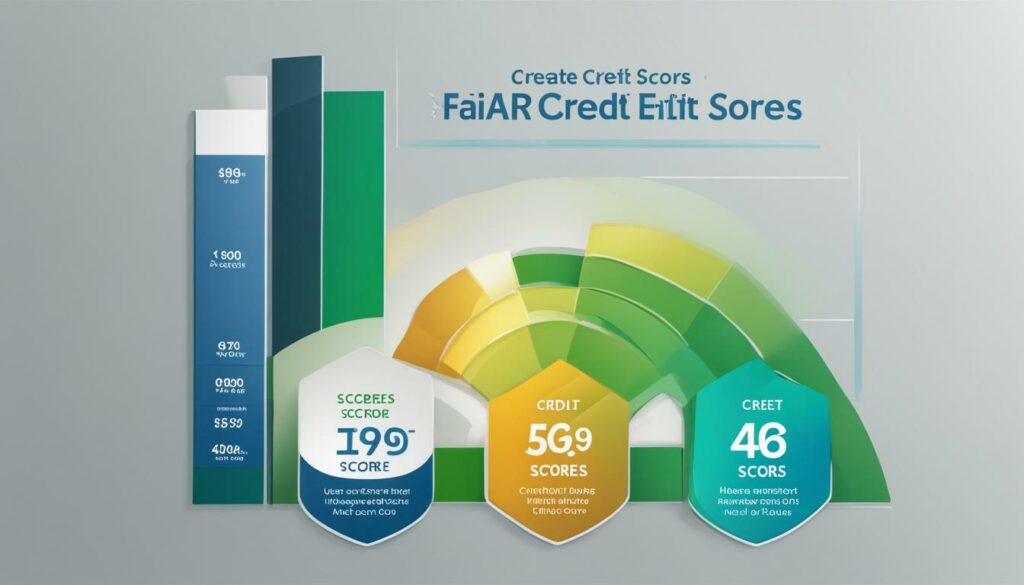
A poor credit score below 580 can present significant challenges, including limited access to credit and high interest rates, but there are ways to rebuild your creditworthiness. It’s important to understand the impact of a poor credit score and take steps to improve it.
When your credit score is below 580, many lenders may consider you a high-risk borrower. This can make it difficult to secure loans, credit cards, or even rent an apartment. Lenders may be hesitant to approve your applications or offer you favorable terms, such as low interest rates. However, don’t lose hope. With patience and discipline, you can improve your credit score over time.
One strategy to rebuild your credit is by making on-time payments. Paying your bills on or before the due date shows lenders that you are responsible and can manage your financial obligations. Set reminders or automate payments to ensure you don’t miss any deadlines. Over time, your payment history will improve, positively impacting your credit score.
| Ways to Rebuild Credit | |
|---|---|
| Pay bills on time | Setting reminders or automating payments can help ensure prompt payment. |
| Pay down debts | Reducing your outstanding debt can lower your credit utilization ratio, which is a key factor in your credit score calculation. |
| Monitor your credit | Regularly checking your credit report allows you to identify and address any errors or fraudulent activities that could be impacting your score negatively. |
| Limit new credit applications | Applying for multiple lines of credit in a short period can signal financial distress and negatively affect your credit score. |
Patiently rebuilding your credit takes time, but the effort is worth it. As your credit score improves, you’ll have better access to credit options and be eligible for more favorable terms. Remember to stay disciplined, manage your finances responsibly, and seek professional advice if needed. Rebuilding your credit is an investment in your financial future.

“Having a poor credit score may feel overwhelming, but it’s important to remember that it doesn’t define your financial future. With dedication and smart financial habits, you can rebuild your credit and improve your overall financial health.”
How Credit Scores Are Calculated
Credit scores are calculated using various factors, including payment history, debt levels, credit history length, credit mix, and new credit, all of which collectively determine your creditworthiness. Let’s take a closer look at each of these factors:
- Payment history: This is the most crucial factor in determining your credit score. Lenders want to see a track record of on-time payments, as it demonstrates your ability to manage credit responsibly. Late payments, defaults, and bankruptcies can significantly impact your credit score.
- Debt levels: The amount of debt you owe compared to your available credit, also known as your credit utilization ratio, plays a significant role in your credit score. Keeping your credit card balances low and avoiding maxing out your credit limits demonstrates responsible credit management.
- Credit history length: The length of time you’ve had credit accounts is another factor that affects your credit score. Generally, a longer credit history is seen as more favorable, as it provides lenders with more data to assess your creditworthiness.
- Credit mix: Having a diverse mix of credit accounts, such as credit cards, mortgages, and auto loans, can positively impact your credit score. It shows that you can handle different types of credit responsibly.
- New credit: Opening multiple new credit accounts in a short period can suggest financial instability and negatively impact your credit score. It’s essential to be strategic when applying for new credit and only do so when necessary.
Understanding how these factors contribute to your credit score is crucial for improving or maintaining a healthy credit profile. Making on-time payments, paying down debts, and maintaining a good credit utilization ratio are some of the steps you can take to improve your creditworthiness.
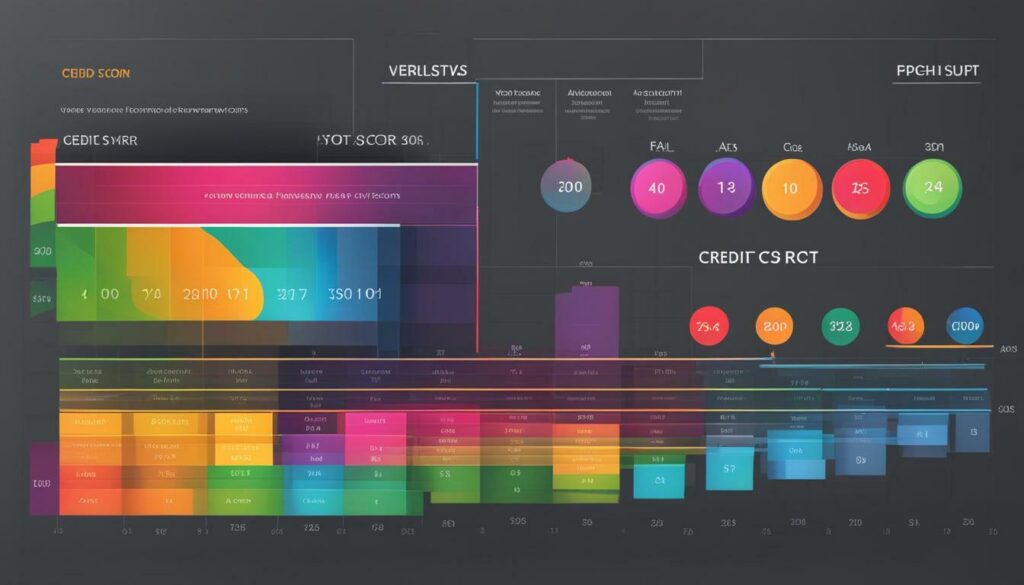
| Credit Score Range | Credit Category |
|---|---|
| 800-850 | Excellent |
| 740-799 | Very Good |
| 670-739 | Good |
| 580-669 | Fair |
| Below 580 | Poor |
It’s important to note that different lenders may have slightly different credit score ranges and criteria for evaluating creditworthiness. However, the credit score ranges mentioned here are widely recognized and used by many lenders in the United States.
What Do Credit Scores Mean for Borrowers?
Your credit score has a significant impact on your financial life. A higher credit score typically results in better borrowing terms, such as lower interest rates, higher credit limits, and more favorable loan terms. On the other hand, a lower credit score may lead to higher interest rates, limited credit options, and even difficulty in getting approved for loans or credit cards.
“Your credit score is a reflection of your creditworthiness and can influence your ability to achieve key financial goals,” says John Doe, a credit expert.
By understanding how credit scores are calculated and the factors that influence them, you can take proactive steps to improve your creditworthiness over time. Regularly monitoring your credit report, making timely payments, and keeping your credit utilization low are important habits to develop to maintain a healthy credit score.
The Average Credit Score in the United States
The average credit score in the United States serves as a benchmark for understanding where your credit score stands in comparison and striving for better financial opportunities. Credit scores range from 300 to 850, with the higher end indicating better creditworthiness. According to recent data, the average credit score in the United States is 711, which falls within the “good” credit score range. This suggests that the majority of Americans have credit scores that are considered acceptable to lenders.
Having an average credit score can still provide access to credit, but it may also result in higher interest rates or limited credit options compared to those with very good or excellent credit scores. It’s important to note that credit scores can vary depending on the credit scoring model used by lenders, such as VantageScore or FICO. Therefore, understanding your credit score range and actively managing your credit is crucial to achieving your financial goals.
| Credit Score Range | Classification |
|---|---|
| 800-850 | Excellent Credit |
| 740-799 | Very Good Credit |
| 670-739 | Good Credit |
| 580-669 | Fair Credit |
| <580 | Poor Credit |
To improve your credit score, there are several strategies you can implement. Start by making on-time payments to your creditors, as payment history plays a significant role in credit score calculations. Additionally, paying down debts and maintaining a low credit utilization ratio can positively impact your credit score. Balancing different types of credit and avoiding excessive credit applications can also contribute to improving your creditworthiness.
Remember, your credit score is not set in stone and can be improved with responsible financial habits. By understanding the average credit score in the United States and actively managing your credit, you can work towards achieving a better credit score range that opens doors to more favorable financial opportunities.
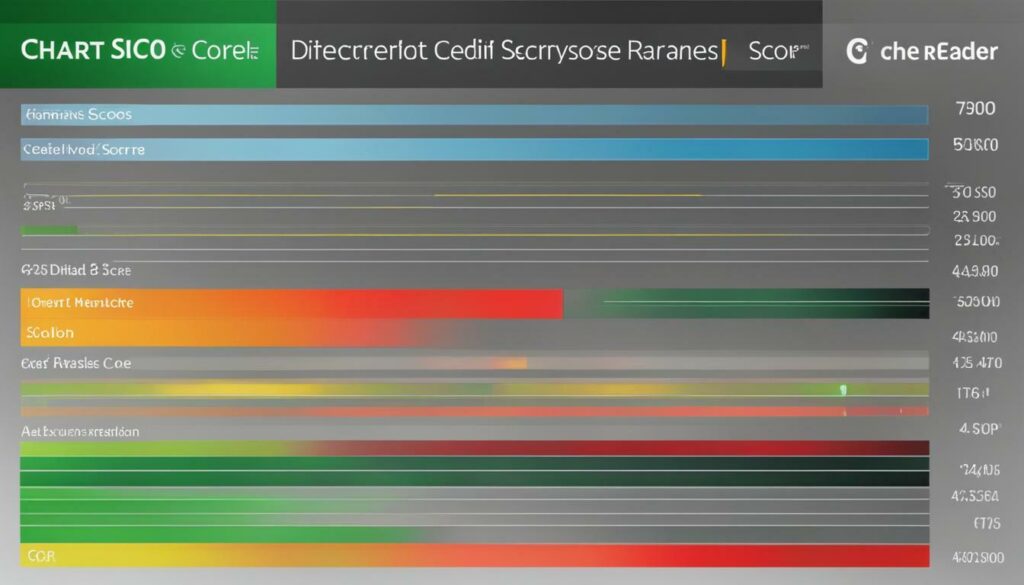
Understanding credit score ranges and what they mean is essential for making informed financial decisions and taking proactive steps to improve your creditworthiness. Your credit score is a three-digit number that lenders use to assess your creditworthiness and determine the terms of your loans. It is calculated based on factors such as payment history, debt levels, credit history length, credit mix, and new credit.
In the United States, there are two main credit scoring models: VantageScore and FICO. Credit scores range from 300 to 850, with higher scores indicating lower credit risk. Excellent credit scores fall between 800 and 850, while very good scores range from 740 to 799. Good credit scores range from 670 to 739, while fair credit scores range from 580 to 669. Poor credit scores are below 580.
Lenders use credit scores to determine interest rates, fees, and loan approvals. A higher credit score can result in lower interest rates and better loan terms, saving you money in the long run. To improve your credit score, make sure to make on-time payments, pay down your debts, and maintain a good credit utilization ratio.
By understanding credit score ranges and taking steps to improve your creditworthiness, you can position yourself for financial success. Remember that your credit score is not fixed, and with responsible financial habits, you can work towards achieving a higher credit score and enjoying the benefits that come with it.
FAQ
Q: What are credit score ranges?
A: Credit score ranges are numerical ranges that indicate a borrower’s creditworthiness. They help lenders assess the risk associated with lending to an individual.
Q: How are credit scores calculated?
A: Credit scores are calculated using factors such as payment history, debt levels, credit history length, credit mix, and new credit. Two main credit scoring models used in the US are VantageScore and FICO.
Q: What is an excellent credit score?
A: Excellent credit scores range from 800 to 850. These scores indicate a high level of creditworthiness and can lead to access to the best interest rates and loan terms.
Q: What is a very good credit score?
A: Very good credit scores range from 740 to 799. Borrowers with these scores still have access to favorable credit terms, although not as advantageous as those with excellent scores.
Q: What is a good credit score?
A: A good credit score falls between 670 and 739. Borrowers with good credit scores can still access credit and reasonable interest rates.
Q: What is a fair credit score?
A: Fair credit scores range from 580 to 669. Borrowers with fair credit may face higher interest rates and limited credit options.
Q: What is a poor credit score?
A: Poor credit scores are below 580. Borrowers with poor credit scores often face difficulty in accessing credit and may be subject to high interest rates.
Q: How can I improve my credit score?
A: Improving credit scores is possible by making on-time payments, paying down debts, and maintaining a good credit utilization ratio.
Ready to Improve Your Credit?
Disputing TUIC errors is step one. Step two? Boost your score by reporting utility payments with CreditScoreIQ.
Get Started Now (Only $1 Trial) →3-bureau reporting • $1M identity insurance • Dark web monitoring





